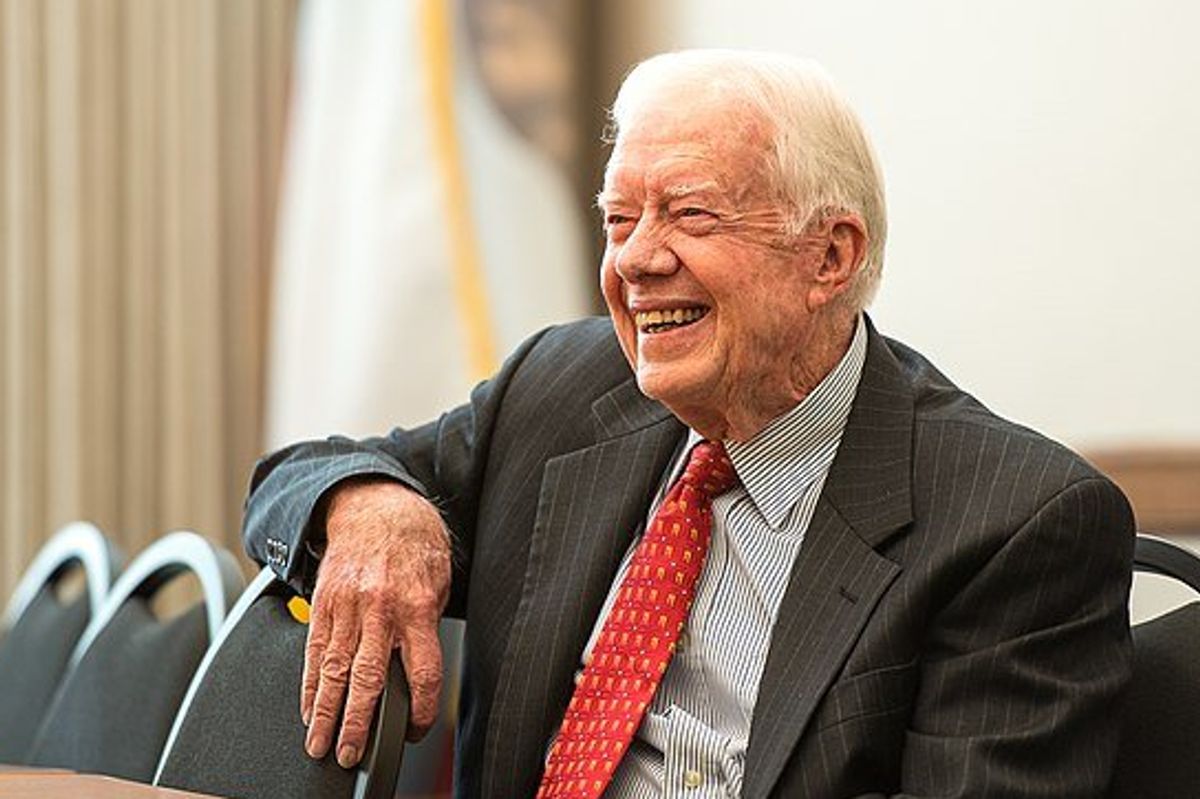'Made me smile': Jimmy Carter’s quote about homosexuality and the Bible resurfaces
Carter was always ahead of his time.

Jimmy Carter at the COmmonwealth Club.
Jimmy Carter was the 39th president of the United States (1977 to 1981). Looking back on his achievements both in and out of office, it’s easy to say that he was a man ahead of his time. He was far ahead of the mainstream when it came to advocating for social justice, human rights, and the environment.
Carter famously installed solar panels on the White House in 1979, only to have them removed by Ronald Reagan.
The former peanut farmer and Navy Lieutenant from Plains, Georgia, was also far ahead of his time when supporting gay rights. In 1976, while running for president, he said he would sign the Equality Act, an amendment to the 1964 Civil Rights Act that would prohibit discrimination based on sexual orientation. “I will certainly sign it, because I don’t think it’s right to single out homosexuals for special abuse or special harassment,” he said.
He continued to advocate for gay rights as president. In 1977, the first gay delegation visited the White House. He also campaigned against California’s Proposition 6, which would have barred gays and lesbians from teaching in the state’s schools and was the first Democratic president to endorse gay rights in the party’s platform in 1980.
It may seem unusual for Cater, a confessed born-again Christian, to be a staunch advocate for gay rights. But he has publicly said that he believes that being pro-gay is wholly aligned with the teachings of Jesus Christ. Carter’s advocacy found itself in the spotlight once again after a meme featuring his thoughts about Christ and homosexuality from 2012 went viral on Reddit's MadeMeSmile forum on April 8, 2024.
Jimmy Carter
byu/PR0CR45T184T0R inMadeMeSmile
The viral quote was taken from an interview with the Huffington Post in 2012, during which Carter promoted his book, NIV, Lessons from Life Bible: Personal Reflections with Jimmy Carter. At the time, LGBTQ rights were the subject of heated debate in Washington, and President Obama had just “evolved” and began publicly supporting same-sex marriage.
"A lot of people point to the Bible for reasons why gay people should not be in the church or accepted in any way,” the interviewer Rev. Paul Brandeis Raushenbush said. But Carter responded by correctly noting that Jesus Christ never said anything about homosexuality.
"Homosexuality was well known in the ancient world, well before Christ was born and Jesus never said a word about homosexuality. In all of his teachings about multiple things—he never said that gay people should be condemned. I personally think it is very fine for gay people to be married in civil ceremonies,” Carter said. "I draw the line, maybe arbitrarily, in requiring by law that churches must marry people. I'm a Baptist, and I believe that each congregation is autonomous and can govern its own affairs.
"So if a local Baptist church wants to accept gay members on an equal basis, which my church does, by the way, then that is fine. If a church decides not to, then government laws shouldn't require them to,” he continued.
Three years later, Carter shared the same sentiments in another interview with the Huffington Post, this time shortly after the U.S. Supreme Court legalized same-sex marriage. “I think Jesus would encourage any love affair if it was honest and sincere and was not damaging to anyone else and I don’t see that gay marriage damages anyone else,” Carter said.
Jimmy Carter’s belief in gay rights stems from his faith as a Christian, but it’s also in complete alignment with his values as an American. Carter believed that the United States was a “beacon” for human rights, and in his 1981 presidential farewell address, he reminded the nation that the job was an ongoing struggle.
“The battle for human rights–at home and abroad–is far from over,” Carter said. “If we are to serve as a beacon for human rights, we must continue to perfect here at home the rights and values which we espouse around the world: A decent education for our children, adequate medical care for all Americans, an end to discrimination against minorities and women, a job for all those able to work, and freedom from injustice and religious intolerance.”
This article originally appeared last year.
- Some timeless bits of wisdom from Jimmy Carter, now the longest-living president in U.S. history. ›
- Jimmy and Rosalynn Carter celebrate 76 years of marriage ›
- Jimmy Fallon asked his viewers why their family is 'weird' and here are 17 of funniest responses ›
- Hospice nurse explains Jimmy Carter's condition - Upworthy ›
- Why Jimmy Carter allowed a convicted felon to nanny his children in the White House - Upworthy ›
- Trans rights advocate skewers Texas Lt. Governor with bathroom prank - Upworthy ›





 Rihanna Nails GIF
Rihanna Nails GIF

 Good luck trying to catch a gazelle.
Good luck trying to catch a gazelle. Chickens will eat just about anything.
Chickens will eat just about anything. There's actually a big difference between horses and zebras besides just the stripes.
There's actually a big difference between horses and zebras besides just the stripes. Stop Right There The End GIF by Freeform
Stop Right There The End GIF by Freeform